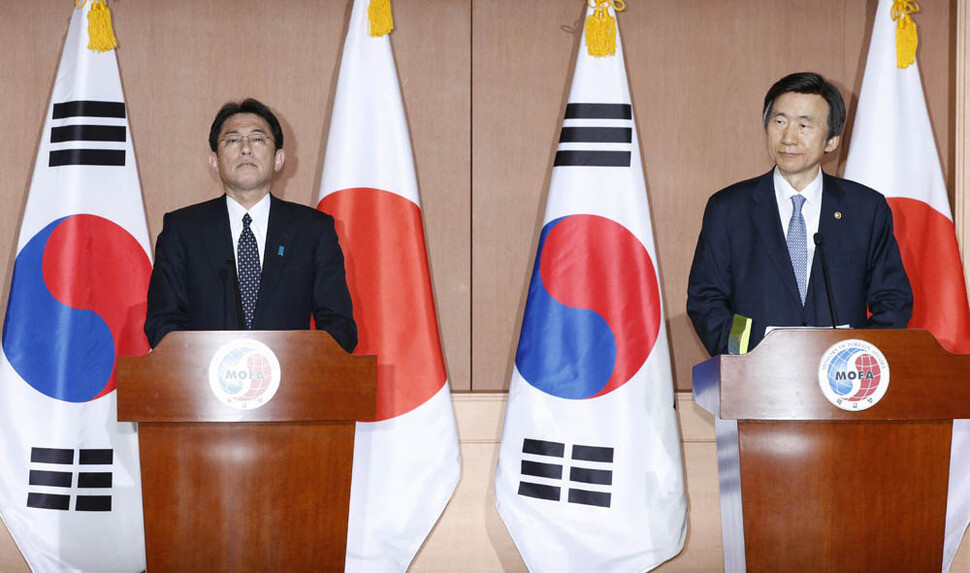hankyoreh
Links to other country sites 다른 나라 사이트 링크
[Park admin. 3 year review] Rocky relations with Japan under Pres. Park

South Korea’s relations with Japan have been consistently rocky since Park Geun-hye took office as president three years ago. The primary reason for this is Japan itself: Prime Minister Shinzo Abe, who took office in Dec. 2012, not only declared plans to revise the Kono and Murayama Statements that had served as a cornerstone for bilateral cooperation over the past two decades, but also visited the controversial Yasukuni Shrine and issued a historically revisionist statement for the seventieth anniversary of Japan‘s World War II defeat.
From early on in her administration, Park took an extreme hard line on Japan, insisting that relations could only improve once the issue of Tokyo’s role in the drafting of “comfort women” - sex slaves to the military during Japan’s imperial days - was resolved. Abe, who fundamentally denies any direct state involvement in the drafting, refused to back down, at which point relations shuddered to a halt and the two sides took their diplomatic war on history to the international stage. It was a case of excessive rigidity leading to self-sabotage.
But that insistence on “principle” with Japan quickly crumbled amid pressure from Washington to restore relations quickly and public fatigue within South Korea. The policy coordination process took place without serious discussions or efforts to establish a consensus. Park went along with Abe’s statement in August 2015, which contained no mention of an apology for Japan’s colonial rule. On Dec. 28, the two countries reached a surprise agreement on the comfort women issue. The humiliating terms of that agreement, which declared the issue “finally and irreversibly resolved” in exchange for a payment of one billion yen (US$8.9 million), triggered a major outcry.
It was Seoul’s concession that allowed the agreement to be reached, but no real signs of improvement in South Korea-Japan relations have been evident. Abe did refer to South Korea as Japan’s “most important neighbor sharing strategic interests” during a Jan. 22 administrative policy speech before the National Diet, but two years have passed since he last described it a “a country that shares our basic values.” It’s a sign that Tokyo views South Korea not as a friend, but as a business partner it has to cooperate with because of the North Korean nuclear and missile issues. Meanwhile, in what amounted to an open mockery of the agreement not to engage in “mutual slander” over the comfort women issue, Japanese Deputy Minister for Foreign Affairs Shinsuke Sugiyama declared before the United Nations Committee on the Elimination of Discrimination against Women on Feb. 16 that “no evidence of forcible recruitment by the military or authorities could be found in any of the documents discovered by the [Japanese] government.”
What Japan ultimately wants from South Korea is military cooperation to contain North Korea and counter China. Japanese Defense Minister Gen Nakatani has asked South Korea to sign the Bilateral General Security of Military Information Agreement, and his South Korean counterpart Han Min-koo said in a Feb. 7 response to the National Assembly that he would “consider it.” This appears to be the relationship South Korea and Japan will have for the immediate future: no mutual trust, but military cooperation to build a trilateral alliance with the US.
By Gil Yun-hyung, Tokyo correspondent
Please direct questions or comments to [english@hani.co.kr]

Editorial・opinion
![[Column] Park Geun-hye déjà vu in Yoon Suk-yeol [Column] Park Geun-hye déjà vu in Yoon Suk-yeol](https://flexible.img.hani.co.kr/flexible/normal/500/300/imgdb/original/2024/0424/651713945113788.jpg) [Column] Park Geun-hye déjà vu in Yoon Suk-yeol
[Column] Park Geun-hye déjà vu in Yoon Suk-yeol![[Editorial] New weight of N. Korea’s nuclear threats makes dialogue all the more urgent [Editorial] New weight of N. Korea’s nuclear threats makes dialogue all the more urgent](https://flexible.img.hani.co.kr/flexible/normal/500/300/imgdb/original/2024/0424/7317139454662664.jpg) [Editorial] New weight of N. Korea’s nuclear threats makes dialogue all the more urgent
[Editorial] New weight of N. Korea’s nuclear threats makes dialogue all the more urgent- [Guest essay] The real reason Korea’s new right wants to dub Rhee a founding father
- [Column] ‘Choson’: Is it time we start referring to N. Korea in its own terms?
- [Editorial] Japan’s rewriting of history with Korea has gone too far
- [Column] The president’s questionable capacity for dialogue
- [Column] Are chaebol firms just pizza pies for families to divvy up as they please?
- [Column] Has Korea, too, crossed the Rubicon on China?
- [Correspondent’s column] In Japan’s alliance with US, echoes of its past alliances with UK
- [Editorial] Does Yoon think the Korean public is wrong?
Most viewed articles
- 1‘We must say no’: Seoul defense chief on Korean, USFK involvement in hypothetical Taiwan crisis
- 2N. Korean delegation’s trip to Iran shows how Pyongyang is leveraging ties with Moscow
- 3[Column] Park Geun-hye déjà vu in Yoon Suk-yeol
- 4Amnesty notes ‘erosion’ of freedom of expression in Korea in annual human rights report
- 5‘Weddingflation’ breaks the bank for Korean couples-to-be
- 646% of cases of violence against women in Korea perpetrated by intimate partner, study finds
- 7[Reportage] On US campuses, student risk arrest as they call for divestment from Israel
- 8“Parental care contracts” increasingly common in South Korea
- 9[Interview] Dear Korean men, It’s OK to admit you’re not always strong
- 10Korean government’s compromise plan for medical reform swiftly rejected by doctors